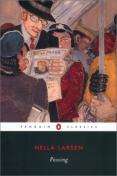BKMT READING GUIDES
Passing (Penguin Classics)
by Nella Larsen
Paperback : 160 pages
3 clubs reading this now
1 member has read this book
Clare Kendry leads a dangerous life. Fair, elegant, and ambitious, she is married to a white man unaware of her African American heritage, and has severed all ties to her past. Clare’s childhood friend, Irene Redfield, just as light-skinned, has chosen to remain within the African ...
Introduction
Clare Kendry leads a dangerous life. Fair, elegant, and ambitious, she is married to a white man unaware of her African American heritage, and has severed all ties to her past. Clare’s childhood friend, Irene Redfield, just as light-skinned, has chosen to remain within the African American community, but refuses to acknowledge the racism that continues to constrict her family’s happiness. A chance encounter forces both women to confront the lies they have told others—and the secret fears they have buried within themselves.
First published in 1929, Passing is a remarkably candid exploration of shifting racial and sexual boundaries.
Editorial Review
The heroine of Passing takes an elevator from the infernal August Chicago streets to the breezy rooftop of the heavenly Drayton Hotel, "wafted upward on a magic carpet to another world, pleasant, quiet, and strangely remote from the sizzling one that she had left below." Irene is black, but like her author, the Danish-African American Nella Larsen (a star of the 1920s to mid-1930s Harlem Renaissance and the first black woman to win a Guggenheim creative-writing award), she can "pass" in white society. Yet one woman in the tea room, "fair and golden, like a sunlit day," keeps staring at her, and eventually introduces herself as Irene's childhood friend Clare, who left their hometown 12 years before when her father died. Clare's father had been born "on the left hand"--he was the product of a legal marriage between a white man and a black woman and therefore cut off from his inheritance. So she was raised penniless by white racist relatives, and now she passes as white. Even Clare's violent white husband is in the dark about her past, though he teases her about her tan and affectionately calls her "Nig." He laughingly explains: "When we were first married, she was white as--as--well as white as a lily. But I declare she's getting darker and darker." As Larsen makes clear, Passing can also mean dying, and Clare is in peril of losing her identity and her life.The tale is simple on the surface--a few adventures in Chicago and New York's high life, with lots of real people and race-mixing events described (explicated by Thadious M. Davis's helpful introduction and footnotes). But underneath, it seethes with rage, guilt, sex, and complex deceptions. Irene fears losing her black husband to Clare, who seems increasingly predatory. Or is this all in Irene's mind? And is everyone wearing a mask? Larsen's book is a scary hall of mirrors, a murder mystery that can't resolve itself. It sticks with you. --Tim Appelo
Discussion Questions
No discussion questions at this time.Book Club Recommendations
Recommended to book clubs by 0 of 0 members.
Book Club HQ to over 88,000+ book clubs and ready to welcome yours.
Get free weekly updates on top club picks, book giveaways, author events and more








